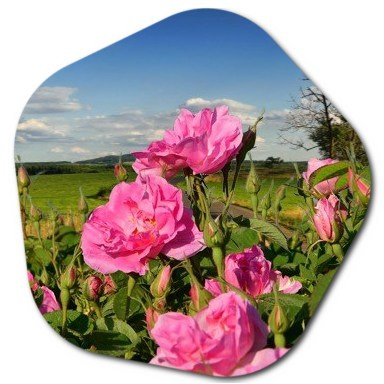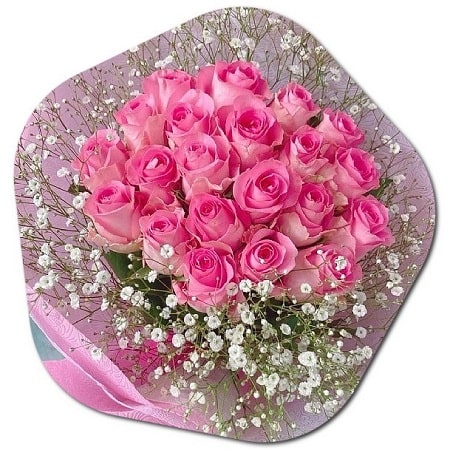Moroccan rose, often referred to as the “Moroccan Rose,” is a specific type of rose that is grown in Morocco. The most famous variety of Moroccan rose is the Damask rose (Rosa damascena), known for its fragrant and highly aromatic petals. These roses are cultivated primarily in the Dades Valley and the town of Kelaat M’gouna in the High Atlas Mountains of Morocco.
Moroccan rose production is closely associated with the creation of rose-related products, particularly rose water and rose oil. The petals of Moroccan roses are carefully harvested by hand during the annual rose festival in Kelaat M’gouna, usually in the late spring or early summer. These petals are then used in the distillation process to produce rose water and rose essential oil.
Moroccan rose water and rose oil are highly sought after for their sweet, floral scent and are used in various applications, including:
- Perfumery: Moroccan rose oil is a key ingredient in the production of high-quality perfumes and fragrances.
- Cosmetics: Rose water and rose oil are used in skincare and beauty products due to their soothing and hydrating properties.
- Culinary: Rose water is used in Moroccan cuisine, particularly in desserts and beverages, to add a distinctive floral flavor.
- Aromatherapy: The pleasant aroma of Moroccan rose oil is used in aromatherapy for relaxation and stress relief.

The cultivation of Moroccan roses and the production of rose water and rose oil play a significant role in the economy and cultural heritage of the region. The rose festival in Kelaat M’gouna is a celebrated event that attracts visitors from around the world, and it is a symbol of Morocco’s rich floral traditions.
How to care for the Moroccan rose?
Caring for Moroccan roses, particularly the Damask roses that are grown in Morocco, requires attention to their specific needs. Here are some guidelines for caring for Moroccan roses:
- Planting Location:
- Choose a well-drained, sunny location for your rose bushes. Roses thrive in full sun, so make sure they receive at least 6 hours of direct sunlight per day.
- Soil Preparation:
- Ensure the soil is well-drained and has good organic content. Roses prefer slightly acidic soil with a pH of around 6 to 6.5. You can amend the soil with compost or well-rotted manure before planting.
- Watering:
- Roses need consistent watering, especially during the growing season. Water deeply to keep the soil evenly moist, but avoid overwatering, as roses don’t like waterlogged conditions.
- Pruning:
- Regular pruning helps maintain the shape of the rose bush, encourages new growth, and removes dead or diseased branches. Prune in late winter or early spring before new growth begins.
- Fertilizing:
- Feed your roses with a balanced rose fertilizer or a slow-release granular fertilizer formulated for roses. Follow the package instructions for application rates and timing.
- Mulching:
- Apply a layer of organic mulch, such as compost or wood chips, around the base of the rose bushes to help retain moisture, suppress weeds, and regulate soil temperature.
- Disease and Pest Control:
- Keep an eye out for common rose diseases like powdery mildew and black spot. Use appropriate fungicides if necessary. Also, be vigilant for pests like aphids and use insecticidal soap or other safe methods to control them.
- Support:
- Use stakes or trellises to support taller rose varieties, especially in windy areas. This prevents the stems from bending or breaking.
- Deadheading:
- Regularly remove spent blooms (deadheading) to encourage the production of new flowers.
- Winter Care:
- In areas with cold winters, protect the rose bushes from freezing temperatures by adding mulch around the base and covering them with burlap or rose cones. Remove the winter protection in spring.
- Harvesting Roses:
- If you plan to use the petals for making rose water or rose oil, harvest the petals carefully when they are in full bloom. It’s best to harvest in the morning when the oils are most concentrated.
- Prune Roses After Flowering:
- After the main flowering period, you can prune your rose bushes again to shape them and encourage new growth.

Moroccan roses are known for their fragrance and are often used for making rose water and rose oil. By providing proper care, you can enjoy the beauty and aroma of these roses in your garden and potentially use the petals for various purposes. Keep in mind that specific care requirements may vary depending on the rose variety and local climate conditions.
The most popular flower in Morocco is the rose
The rose, particularly the Damask rose (Rosa damascena), is one of the most popular and iconic flowers in Morocco. The Damask rose is highly regarded for its fragrance, and it is widely cultivated in the Dades Valley and the town of Kelaat M’gouna in the High Atlas Mountains of Morocco.
Morocco is famous for its rose festivals, where the annual rose harvest is celebrated. During the harvest season, typically in late spring or early summer, locals and visitors participate in the traditional gathering of rose petals. These petals are used to produce rose water and rose essential oil, which are essential ingredients in Moroccan perfumes, cosmetics, and culinary products.
The Damask rose is not only popular for its aromatic qualities but also for its cultural significance and economic importance in Morocco. The rose festivals and the cultivation of these roses have become a significant part of the country’s cultural heritage and economy. The unique qualities and uses of Moroccan roses make them highly cherished and celebrated throughout the country.
